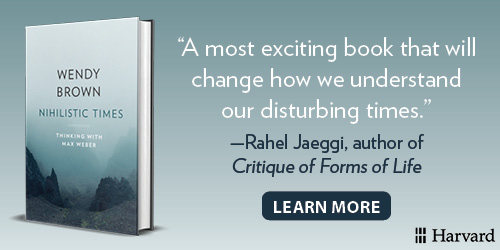Failure, Stealth, and Philosophy
“Every success is the tip of an iceberg of failure.”
That’s Roy Sorensen, professor of philosophy at the University of Texas at Austin, in a highly engaging and entertaining interview at The Workbench, the site for “conversations with academic writers on their craft,” created by Nathan Ballantyne, associate professor of philosophy, cognition, and culture at Arizona State University (previously).

There’s a lot in this interview. The above quote comes from a section in which Sorenson and Ballantyne are discussing publishing advice for graduate students, following some earlier framing of the philosophy job market as “a lottery in which participants can buy more tickets with their research, conference going, contacts, and so on.” Here it is with more context:
Ballantyne: It’s good to inform students that rejection is the norm and also emphasize that rejection doesn’t always happen because a paper is unpublishable. But how do you drum up commitment in view of poor odds and disappointments? Let me put it this way: From an early-career academic’s perspective, you are a Powerball lottery winner, but you’ve bought many tickets, including ones that languish in file folders. Do you have any stories of rejection and perseverance to inspire or console?
Sorensen: I don’t encourage when the discouragement is rational and proportional. I may note that failure is a risk for any ambition. And it is worth thinking about what kind of failure one might become. As a teenager, I had an ambition to become a great chess player. Failing at that is terrible because chess makes you narrow. The hours spent on it do not connect to other questions. It is an encapsulated domain. But philosophy connects with many questions. Failing to become an academic philosopher is a more attractive backup than most other failures.
Ballantyne: How inspiring!
Sorensen: It is an engineering point. One notches beams to ensure they break at the least damaging point. One builds a house that will gracefully deteriorate. One budgets for breakage in construction. Every success is the tip of an iceberg of failure. When complimented on how many books I have written, I invite my listener to consider all the books that I failed to write.
The two discuss various aspects of Sorenson’s writing style, from his predilection for paradoxes to his use of humor to his taste for “stealth philosophy.” Ballantyne asks him about his use of various conceits in his writing. Here’s what follows:
Sorensen: The conceits may stem from my preference for stealth philosophy. Talk about something that does not seem like philosophy and have the audience realize belatedly that they are doing philosophy.
Ballantyne: Who are the great stealth philosophers?
Sorensen: Plato, David Hume, William James, Richard Smullyan, William Lycan. These camouflaged owls of wisdom get past defensive bracketing of philosophical ideas. The brackets get erected after children fail to make progress on questions such as ‘Does time have a beginning?’ and ‘Is there an edge to space?’. More brackets get erected when non-philosophers use ‘philosophy’ as a label for issues that cannot be profitably pursued. Stealth philosophers side-step this conversation blocker. They show the continuity of philosophical beliefs with other beliefs. For instance, the stealth philosopher of perception will just presuppose the visible objects must emit, reflect, or refract light—as if it is just common sense or well-established science. They will then have students count the punched holes of the handout or the shadow cast by that handout. These anomalies make the students say “Hey, wait a minute!” and then dis-inter the presupposition from the common ground of the conversation. The stealth philosopher knows where bodies are buried. After students dig some up, they tread with more geological awareness over the surface of daily life.
Ballantyne: How do you engage in stealth philosophy when the audience is philosophically savvy? They know where the bodies are buried. Can you still catch them off guard?
Sorensen: Yes, because the philosophers still need to presuppose much. They must inhibit default patterns of thinking, such as attributing knowledge (when belief suffices) and attributing intention (when coincidence suffices). Since they cannot always be on their toes, they sometimes fail to notice some camouflaged philosophy. Bertrand Russell once asked G. E. Moore whether he ever lied. Moore said yes and Russell concluded that this was the only lie Moore ever told. Saul Kripke chided Russell for failing to notice this is an instance of the liar paradox. Others pictured Russell as the stealth philosopher, planting the liar paradox in a compliment to Moore. I have sometimes been surprised by a stealthy cross-examiner. During a Q&A period at Oxford, Jonathan Dancy just asked me a sequence of mild, clarificatory questions to set up the main question. There was no main question. For my quick answers constituted enough for a syllogism whose conclusion was the negation of my thesis.
The whole interview is here.
Discussion welcome.



I’m not sure that many people who have spent time trying to get non-academic jobs would agree with Sorensen’s assessment. Philosophy and chess do not seem particularly disanalogous in this respect to me, as someone who has tried and repeatedly failed to get others to value my degree, skills or knowledge outside of academia, and who has seen many others fail to do so as well. Now perhaps we should take some value in that failure as a way of reflecting upon other life lessons, but self-reflections don’t put bread on the table.
I think Sorensen and Ballantyne’s discussion of failure and rejection as standard parts of the process is an important one. A version of this insight helped me get over some tough motivational humps during the dissertation writing phase.
With regard to peer reviewed publishing, however, I found it entirely inadequate to motivate continued efforts. This is in part for reasons articulated by Ken’s earlier comment – the efforts to further refine and calibrate my writing and submission strategies for academic publication would have involved making myself ever more specialized in ways that weren’t required by my (now previous) teaching position and would serve little purpose for myself or others in the event they didn’t result in more stable academic employment.
But it was really worse than this – I found the insight Ballantyne highlights *counter-motivating*: “It’s good to inform students that rejection is the norm and also emphasize that rejection doesn’t always happen because a paper is unpublishable.”
When expert advisors identify a paper as ready for submission and suggest submitting to Journal-X, only for the editors of Journal-X to determine that it isn’t even worth sending to reviewers…
and
When expert Reviewer-1 identifies the paper as an important contribution to the literature that needs a few tweaks, while the infamous Reviewer-2 identifies it as worthless…
and
When one and the same desk rejection identifies the paper’s thesis as BOTH trivially true AND subject to putative counterexamples… (but perhaps this last one was just me)
…this doesn’t simply call into question the professional quality of one’s work. It calls into question the very expertise we’re supposed to be cultivating and selecting for. Or perhaps the problem is not with our philosophical expertise, but simply that journals and reviewers and editors are so overwhelmed with quality submissions, so that the relevant professional competency is generally necessary but not sufficient for successful publication. But then further submissions just seem like they are further burdening an already burdened system, either to no purpose (if they don’t result in an academic career), or to my own future detriment (if I have to do my part as a future reviewer in this increasingly overwhelemed system).
If a philosophy education really has all the benefits to thinking critically about our lives that we claim when promoting the major and our gen ed classes, one would hope that we could do a bit better than to continue subjecting ourselves and one another to such practices.